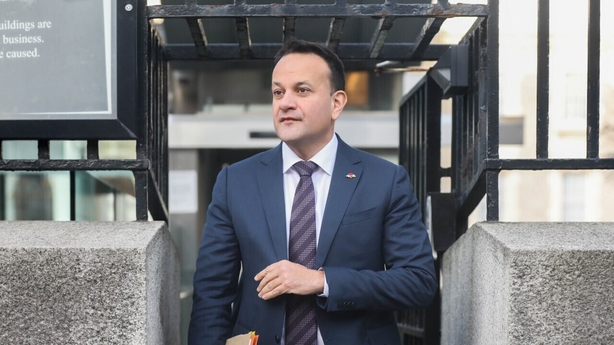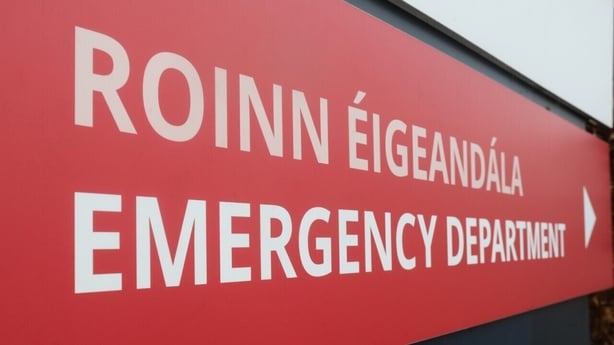Minister for Health Stephen Donnelly has said that overcrowding in hospitals could get worse, and that the HSE is to call on senior medical staff, such as consultants, to come in at weekends for the next few weeks to help alleviate the situation.
Speaking on RTÉ's News At One, Mr Donnelly said that while staffing numbers were being increased, senior decision makers were needed on-site.
He said: "We have to hire more people. Earlier this year, I sanctioned a big increase in the number of emergency medicine consultants.
"While we're building that, because that takes time, there is an ask of consultants and appropriate medical staff to come in, just for the next few weeks, to come in at the weekends.
"It’s something I discussed with the HSE yesterday when I met them and it’s a call the HSE will be putting out today."
Mr Donnelly said however that such staff are not obliged to do so under their current contract, adding that they "are relying on their goodwill".
In response, the Irish Medical Organisation said that consultants are "routinely working far in excess of 'normal' working hours in addition to providing on call services 24 hours a day, seven days a week and providing structured weekend shifts."
Professor Matthew Sadlier of the IMO's Consultant Committee said that the commitment of the workforce in terms of meeting patients' needs was not the problem, adding that the core issue was "a lack of physical capacity in terms of beds and the chronic shortage in the number of consultants available".
The minister said there was "a very important reduction" in overcrowding numbers over the past day, adding that "the best-run healthcare systems in Europe" were experiencing "very similar strains".
He said it was "entirely possible" that the situation could deteriorate.
"Certainly that’s the view of the HSE, when I met them yesterday. Based on my discussions with the Chief Medical Officer and what might still be coming in terms of the flu wave, which is causing huge pressure in our emergency departments, yes unfortunately that is entirely possible," he said.
We need your consent to load this rte-player contentWe use rte-player to manage extra content that can set cookies on your device and collect data about your activity. Please review their details and accept them to load the content.Manage Preferences
Mr Donnelly said the situation was one that the Government had warned about for several months, adding that the HSE has secured 185 private hospital beds to try to alleviate the crisis since last month.
"The majority of those are being used," the minister said.
"I met with the HSE team yesterday and made it very clear that we need to go further than that, we need to be more ambitious, and that the funding required is available to be used."
On the prospect of striking a similar public-private hospital deal as seen at the height of the pandemic in order to bring more beds into use, Mr Donnelly said the HSE "was already doing that".
"What the HSE is trying to do is work with the private providers, to say 'we want to use your capacity', my message and Government’s message very clearly is 'all private capacity should be used'.
"What the HSE is trying to do now is use that without leaving a lot of beds empty, which is something that happened during the first wave of Covid," he said.
Asked if he accepted that lives were being put at risk as a result of the overcrowding crisis, the minister said that it was clear overcrowding increases patient safety risks.
We need your consent to load this rte-player contentWe use rte-player to manage extra content that can set cookies on your device and collect data about your activity. Please review their details and accept them to load the content.Manage Preferences
Co-leader of the Social Democrats co-leader Róisín Shorthall said the Minister for Health "making comments across the airwaves is not doing the job properly".
She said that the minister, Department of Health officials and the HSE need to meet and develop a plan to deal with the crisis.
Speaking on RTÉ's Drivetime, Ms Shortall said it was "the worst emergency we've ever had in this country in terms of our health service" and it was "entirely predictable".
Ms Shorthall said there "is a need for an immediate response" and that private capacity should be looked at.

Earlier, Taoiseach Leo Varadkar said it was unacceptable that sick patients are being left for hours or overnight on trolleys.
Speaking ahead of his first Cabinet meeting this year and since becoming Taoiseach again, Mr Varadkar said there were 700 people on trolleys as of 8am this morning, down from yesterday, according to the HSE.
He said that while it was not acceptable to have so many patients on trolleys, there were 1,000 more beds than three years ago and 6,000 more doctors and nurses, with GPs given better access to diagnostics.
Both Mr Varadkar and Mr Donnelly have said any resources required by the HSE will be made available to tackle overcrowding and long waiting times.
Mr Donnelly briefed Cabinet colleagues on the challenges facing the health service, but no significant decisions were made during today's meeting.
In a memo, Mr Donnelly gave an overview of the actions currently under way to alleviate the crisis.
The Cabinet heard that there has been a 15% increase in the number of over 75s presenting in emergency departments compared to 2019.
The minister said he wanted to acknowledge the huge work done across the country in terms of getting patients off trolleys and into beds by this morning.

He said the situation had been very difficult for patients and their families, and also for healthcare workers who had been under sustained pressure for a long time.
Mr Donnelly said in spite of an increase in resources for the healthcare system, what was being witnessed was a "perfect storm" with the impact of Covid-19 and RSV as well as the flu wave, which he said had come "heavier and earlier" than previous years leading to intense pressure across Europe.
He said permanent solutions to the healthcare crisis could be found outside community departments.
Whilst virus numbers were plateauing now, he said, they could increase again due to socialisation over Christmas and New Year and again urged people who are eligible to take the flu vaccine and Covid vaccine boosters.
The Irish Nurses and Midwives Organisation said there were 838 admitted patients waiting for a hospital bed this morning, down from the record high of 931 yesterday.
The hospitals worst affected are University Hospital Limerick with 76 patients waiting, Sligo University Hospital with 65, Cork University Hospital with 62 and University Hospital Galway with 51.
Letterkenny University Hospital has 46 patients waiting and St Vincent's University Hospital in Dublin has 45.
Reporting by Tommy Meskill, Eleanor Burnhill

